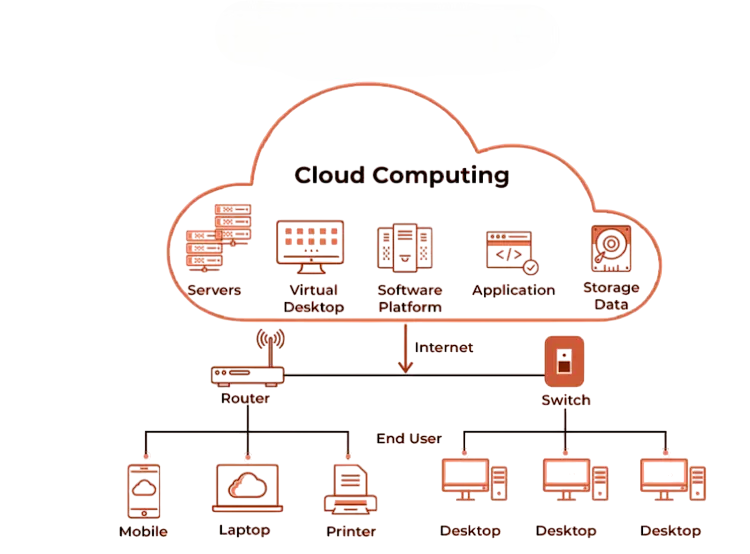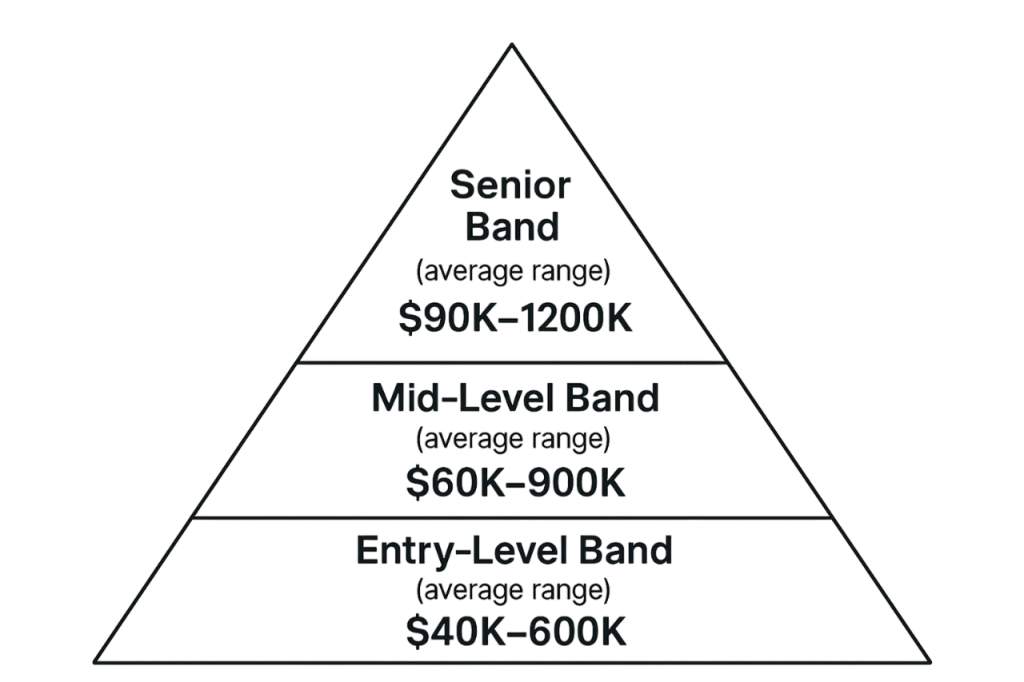
- Getting Started with DevOps
- Roles and Responsibilities of a DevOps Engineer
- Salary Trends Across Different Countries
- Salary Comparison by Experience Level
- Factors Affecting Cloud Engineer Salaries
- Cloud Engineer Salaries in Different Industries
- Entry-Level to Senior-Level Salary Packages
- Certifications That Boost Cloud Engineer Salary
- Freelancing vs Full-Time Cloud Engineer Salaries
- Top Companies Hiring Cloud Engineers
- Future Salary Trends in Cloud Computing
- Conclusion
Getting Started with DevOps
Cloud engineering is essential within the broader cloud computing domain, focusing on developing, deploying, and managing cloud-based infrastructure and applications. Cloud engineers work with Cloud Computing Course platforms like Amazon Web Services (AWS), Microsoft Azure, and Google Cloud Platform (GCP) to design scalable, reliable, and secure cloud solutions. The growing adoption of cloud technologies across industries has increased demand for engineers who can architect, deploy, and maintain complex cloud infrastructures. With businesses migrating their workloads to the cloud to achieve cost savings, flexibility, and scalability, cloud engineers play a vital role in ensuring these cloud environments run smoothly, securely, and efficiently. To succeed in this evolving field, cloud engineers need to deeply understand cloud architecture, automation tools, networking, and security practices.
Role of a Cloud Engineer
A cloud engineer is responsible for various tasks related to the cloud environment, from designing and deploying infrastructure to ensuring security and maintaining performance. The role typically involves:

- Cloud Infrastructure Design: Cloud engineers design the architecture of cloud-based systems, ensuring they meet the business needs for scalability, security, and cost-efficiency.
- Deployment and Automation: Cloud engineers pursuing a Career in Cloud Computing use tools such as Terraform, AWS CloudFormation, and Azure Resource Manager to automate the deployment and provisioning of cloud resources, making processes repeatable and efficient.
- Cloud System Maintenance: Cloud engineers monitor systems to ensure optimal operation. They troubleshoot issues, optimize performance, and ensure system availability by managing resources and monitoring tools.
- Security and Compliance: Securing cloud-based environments is a significant responsibility. Cloud engineers implement security measures like firewalls, encryption, identity management, and vulnerability assessments to ensure the security of the cloud infrastructure.
- Collaboration and Integration: Cloud engineers collaborate with other teams (development, operations, security) to integrate cloud technologies with existing applications and services.
- Cloud Cost Management: They are responsible for managing cloud costs, optimizing resource usage, and identifying opportunities for cost-saving measures without compromising performance.
- Entry-level cloud engineers typically earn between $70,000 and $90,000 per year, with mid-level engineers earning $90,000 – $120,000.
- Senior-level cloud engineers or those with specialized expertise may earn upwards of $150,000 – $180,000 annually, particularly in regions like Silicon Valley, New York, or Seattle. United Kingdom:
- Entry-level salaries start at around £30,000 – £45,000 annually.
- Mid-level engineers typically earn £45,000 – £70,000 annually.
- Senior professionals in Data Science and Cloud Computing can expect salaries between £70,000 – £100,000, especially in high-demand areas like London. India:
- In India, the Salary for an entry-level cloud engineer ranges between ₹6,00,000 – ₹10,00,000 annually.
- Mid-level salaries are generally between ₹10,00,000 – ₹15,00,000, with senior cloud engineers earning ₹15,00,000 – ₹25,00,000 per year, depending on expertise. Australia:
- Entry-level cloud engineers in Australia earn between AUD 80,000 – AUD 100,000 annually.
- Mid-level professionals earn around AUD 100,000 – AUD 130,000.
- Senior-level cloud engineers typically make AUD 130,000 – AUD 160,000 per year. Canada:
- In Canada, entry-level salaries range between CAD 60,000 – and CAD 80,000.
- Mid-level salaries range from CAD 80,000 to CAD 110,000, while senior cloud engineers can earn CAD 120,000 to CAD 150,000.
- Entry-level cloud engineers focus on learning cloud technologies, assisting with deployments, and managing basic cloud infrastructure tasks. As they gain practical experience, they usually receive a lower salary.
- Average Salary: $70,000 – $90,000 in the United States, ₹ $6,00,000—₹ $10,00,000 in India, and £30,000 – £45,000 in the UK. Mid-Level Cloud Engineers (3-5 years):
- Engineers who have completed an Introduction to Cloud Computing and have a few years of experience are typically responsible for designing and deploying cloud solutions and maintaining cloud systems. Their salaries increase as they gain more expertise and handle more complex tasks.
- Average Salary: $90,000 – $120,000 in the United States, ₹10,00,000 – ₹15,00,000 in India, and £45,000 – £70,000 in the UK. Senior Cloud Engineers (5+ years):
- Senior engineers typically lead cloud architecture projects, design complex systems, and are responsible for the security and performance of cloud-based applications. With advanced expertise, they can command higher salaries.
- Average Salary: $120,000 – $180,000 in the United States, ₹15,00,000 – ₹25,00,000 in India, and £70,000 – £100,000 in the UK.
- Location: Salaries are generally higher in cities with a high cost of living and a strong demand for cloud talent, such as Silicon Valley or London.
- Experience and Expertise: Senior engineers with years of hands-on experience in managing complex cloud systems and specialized skills (e.g., cloud security, automation, multi-cloud environments) tend to earn significantly more.
- Cloud Platform Specialization: Expertise in specific cloud platforms (AWS, Azure, GCP) or niche tools like Kubernetes, Terraform, or containerization technologies can also affect salary levels.
- Certifications: Certification from major cloud providers (e.g., AWS Certified Solutions Architect, Azure Solutions Architect Expert) can lead to higher salaries as they validate your skills and expertise.
- Industry Demand:Industries like finance, healthcare, and tech companies often pay more due to the high value placed on cloud expertise, particularly with platforms like Google Cloud Platform (GCP) , in managing sensitive data and ensuring performance.
- Company Size: Larger organizations with complex cloud infrastructure needs may offer higher salaries than smaller companies or startups.
- Technology: The technology industry typically offers the highest salaries for cloud engineers due to the complex and dynamic cloud architectures these companies require.
- Finance: Banks and financial institutions often require cloud engineers to manage sensitive data and ensure system security, leading to higher pay.
- Healthcare: Healthcare companies, especially those in telemedicine, electronic health records, and research, require secure and reliable cloud infrastructure, including Scalable Cloud Data Warehousing with AWS Redshift , resulting in attractive compensation packages.
- Consulting/Cloud Service Providers: Working as a consultant for major cloud service providers or through consulting firms (e.g., Accenture, Deloitte) can often result in higher salaries due to the expertise required for large-scale cloud implementations.
- Government and Public Sector: Although cloud engineers in the public sector may earn less than private companies, specific government roles, particularly in defense or federal agencies, can offer competitive salaries.
- As they start their careers, entry-level engineers typically focus on simple tasks such as setting up and maintaining cloud infrastructure, working under supervision, and learning the tools of the trade.
- Average Salary: $40,000 – $90,000 in the U.S. or ₹6,00,000 – ₹10,00,000 in India. Mid-Level Engineer:
- At this stage, engineers who have completed a Cloud Computing Course have gained hands-on experience and can work independently on more complex projects. They contribute to designing, deploying, and optimizing systems while often mentoring junior team members. Their role involves a balance of technical expertise, problem-solving, and collaboration across teams.
- Average Salary: $60,000 – $900,000 in the U.S. or ₹12,00,000 – ₹75,00,000 in India. Senior Cloud Engineer:
- Senior engineers have more autonomy, design cloud solutions, manage teams, and take ownership of the cloud infrastructure. They are expected to have automation, cloud security, and performance optimization expertise.
- Average Salary: $90,000 – $180,000 in the U.S. or ₹12,00,000 – ₹25,00,000 in India.
- AWS Certified Solutions Architect – Associate/Professional: This certification is one of the most recognized in the industry and validates your skills in designing and deploying cloud systems on AWS.
- Microsoft Certified: Azure Solutions Architect Expert: This certification demonstrates proficiency in designing and managing Azure cloud solutions and is highly valued in organizations using Microsoft Azure.
- Google Professional Cloud Architect:A Google certification showing proficiency in designing cloud systems and managing Cloud Data Ingestion on the Google Cloud Platform.
- Certified Kubernetes Administrator (CKA): Kubernetes is essential for managing containerized applications, and this certification proves expertise in deploying and managing Kubernetes clusters.
- Certified Cloud Security Professional (CCSP): A security-focused certification ideal for engineers looking to work in secure environments and enhance cloud security.
- Freelancing: Cloud engineering freelancers can charge anywhere from $75 to $150 per hour, depending on experience and project complexity. However, they must handle their taxes, benefits, and insurance.
- Full-Time Employment: Salaries for full-time cloud engineers who monitor and manage systems using tools like AWS CloudWatch tend to be lower hourly but come with a steady income, benefits, and career advancement opportunities.
- Amazon (AWS)
- Microsoft (Azure)
- Google (GCP)
- IBM
- Oracle
- Accenture
- Netflix
- Airbnb
- Salesforce
- Spotify
Learn how to manage and deploy cloud services by joining this Cloud Computing Online Course today.
Salary Trends Across Different Countries
Salaries for cloud engineers can vary significantly based on location, industry, experience, and skill set. As demand for cloud professionals continues to rise globally, the salary range reflects the value of cloud expertise and regional economic factors.
- United States:
Salary Comparison by Experience Level
Their experience level heavily influences the Salary of a cloud engineer. Here’s a breakdown based on years of experience:
- Entry-Level Cloud Engineers (0-2 years):
Unlock your potential in Cloud Computing with this Cloud Computing Online Course .
Factors Affecting Cloud Engineer Salaries
Several factors can influence the Salary of a cloud engineer, including:
Cloud Engineer Salaries in Different Industries
The cloud engineer’s Salary can vary across industries. Some of the highest-paying sectors for cloud engineers include:
Looking to master Cloud Computing? Sign up for ACTE’s Cloud Computing Master Program Training Course and begin your journey today!
Entry-Level to Senior-Level Salary Packages
The salary disparity between entry-level and senior-level cloud engineers is significant, reflecting differences in responsibility, complexity of tasks, and required expertise:

- Entry-Level Cloud Engineer:
Certifications That Boost Cloud Engineer Salary
Cloud certifications can significantly boost a cloud engineer’s earning potential by demonstrating specialized expertise. Some of the most valuable certifications include:
Freelancing vs Full-Time Cloud Engineer Salaries
Freelancing offers cloud engineers more flexibility but comes with a different pay structure. While full-time cloud engineers enjoy a consistent salary and benefits (healthcare, paid leave, etc.), freelancers typically charge higher hourly rates but lack the stability and perks of full-time employment.
Top Companies Hiring Cloud Engineers
The demand for cloud engineers is widespread across various industries, with top tech companies often leading the hiring surge. Some of the top companies hiring cloud engineers include:
These companies always seek skilled cloud professionals to help them build scalable and secure cloud infrastructures.
Boost your chances in Cloud Computing interviews by checking out our blog on Cloud Computing Interview Questions and Answers!
Future Salary Trends in Cloud Computing
As cloud computing continues to grow and evolve, cloud engineers can expect salaries to continue to rise, especially in specialized roles. Factors like adopting multi-cloud strategies, the rise of cloud-native technologies (such as Kubernetes), and increased demand for AI and machine learning integrations into cloud services will drive salaries upward. Cloud engineers with automation, machine learning, and security expertise will see robust demand. Additionally, cloud professionals with experience in hybrid and multi-cloud architectures will continue to be highly sought after.
Conclusion
Cloud engineering is a promising career path with ample opportunities for growth and advancement. As cloud technologies continue to evolve, professionals in the field can expect competitive salaries, especially those with specialized skills and certifications. While salaries vary by location, experience, and industry, individuals who have completed a Cloud Computing Course are well-positioned to enter this growing field, making cloud engineering a lucrative and rewarding career choice for those interested in technology and cloud computing. Formal education, practical experience, and ongoing education are all necessary to become a cloud engineer, but the effort pays off in the form of a lucrative and in-demand job in technology. Cloud engineering involves more than just technical expertise; it also involves creativity, problem-solving, and teamwork skills that can be developed with commitment and practice.





